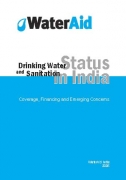WaterAid India
Mobilising communities for WASH
Posted on 13 Dec, 2022 04:49 PMConvened to mark the successful conclusion of the Women+Water Alliance project in select districts of Madhya Pradesh and Maharashtra, U.S.

Climate change threatens water access for world’s poorest communities
Posted on 20 Mar, 2021 02:14 PMThe impact of climate change on people’s water supplies is threatening to put progress on bringing clean water to all back decades unless urgent action is taken to help the world’s poorest communities adjust to changing weather patterns.

Rapid hygiene study: Hand hygiene for COVID-19 and beyond in India
Posted on 15 Oct, 2020 09:33 AMThis year, Global Handwashing Day (observed annually on October 15) is particularly significant given the COVID-19 pandemic. While vaccine trials are ongoing, protective actions such as handwashing with soap is a critical first line of defence and cost-effective public health intervention.

Water, the first line of defence against climate change
Posted on 22 Mar, 2020 09:50 AMWater insufficiency is a challenging problem globally with 1 in 10 people lacking a basic water pump or covered well close to home.

Women lead the way in water quality surveillance
Posted on 06 Mar, 2020 01:45 PMHistorically, water is a gendered burden, with women being the primary caregivers responsible for cooking, washing and cleaning chores in the house and in modern times in institutions (teachers, anganwadi and healthcare workers). Women have traditionally been associated with various water related tasks - be it collecting, fetching, or purifying water.

Water and sanitation sector needs a budget push
Posted on 30 Jan, 2016 12:56 PMWhile the WatSan sector has been prioritised in the country’s policy agenda through the launch of the Swachh Bharat Mission, last year’s budgetary outlay was way below desired levels.

Review of drinking water and sanitation status in India - A report by WaterAid India
Posted on 02 Jun, 2009 12:40 PM This paper by WaterAid India is an assessment of the drinking water and sanitation situation in the country in terms of coverage and financing gaps, if any, keeping the targets of the Millennium Development Goals as a benchmark for the assessment.
This paper by WaterAid India is an assessment of the drinking water and sanitation situation in the country in terms of coverage and financing gaps, if any, keeping the targets of the Millennium Development Goals as a benchmark for the assessment.
Sanitation firmly on the map: But still a long way to go – A position paper for the second South Asia Conference on Sanitation by WaterAid India (2006)
Posted on 02 Jun, 2009 12:37 PMThis paper by WaterAid India highlights the progress, key issues and challenges and recommendations for improving sanitation coverage with special focus on the poor. It is based on the experience of WaterAid India, other major sector agencies and NGOs and also takes into consideration the programme of state and national governments of India for sanitation promotion.